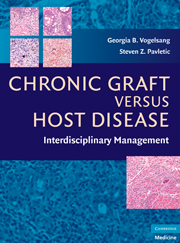Book contents
- Frontmatter
- Contents
- List of Contributors
- Preface
- PART I GENERAL PRINCIPLES
- PART II CLINICAL MANAGEMENT
- 9 Diagnosis and Staging
- 10 Chronic Graft versus Host Disease Pharmacology
- 11 Prevention of Chronic Graft versus Host Disease
- 12 Front Line Treatment of Chronic Graft versus Host Disease
- 13 Salvage Therapy in Chronic Graft versus Host Disease
- 14 Evaluating Therapeutic Response in Chronic Graft versus Host Disease
- 15 General Principles of Ancillary and Supportive Care
- PART III ORGAN SITE OR SYSTEM-SPECIFIC MANIFESTATIONS
- PART IV SPECIAL CONSIDERATIONS IN CHRONIC GVHD
- Index
- Plate section
15 - General Principles of Ancillary and Supportive Care
from PART II - CLINICAL MANAGEMENT
Published online by Cambridge University Press: 26 August 2009
- Frontmatter
- Contents
- List of Contributors
- Preface
- PART I GENERAL PRINCIPLES
- PART II CLINICAL MANAGEMENT
- 9 Diagnosis and Staging
- 10 Chronic Graft versus Host Disease Pharmacology
- 11 Prevention of Chronic Graft versus Host Disease
- 12 Front Line Treatment of Chronic Graft versus Host Disease
- 13 Salvage Therapy in Chronic Graft versus Host Disease
- 14 Evaluating Therapeutic Response in Chronic Graft versus Host Disease
- 15 General Principles of Ancillary and Supportive Care
- PART III ORGAN SITE OR SYSTEM-SPECIFIC MANIFESTATIONS
- PART IV SPECIAL CONSIDERATIONS IN CHRONIC GVHD
- Index
- Plate section
Summary
Chronic graft versus host disease (GVHD) is characterized by polymorphic clinical manifestations with varying severity and clinical course. Prolonged systemic immunosuppressive therapy including glucocorticoids is necessary to control disease severity and nonrelapse mortality. Treatment, combined with delayed immunologic reconstitution associated with chronic GVHD, increases the risk of infections and other complications. Because the clinical manifestations of chronic GVHD can persist for prolonged periods, the complete spectrum of complications may cause significant and sometimes irreversible morbidity. It follows that ancillary therapy and supportive care are central components in the long-term management of chronic GVHD after allogeneic hematopoietic cell transplantation (HCT).
Guidelines for ancillary and supportive care have recently been established by the Ancillary Therapy and Supportive Care Working Group of the National Institutes of Health (NIH) Consensus Development Project on Criteria for Clinical Trials in Chronic GVHD [1]. The committee's recommendations include therapy for organ-specific symptoms, patient education, appropriate follow-up and preventive measures, and guidelines for the prevention and management of infections and other common complications.
The recommendations are organized according to an evidence-based system that reflects the strength of recommendations and the quality of evidence supporting them (Table 15.1). Currently, 44% of the recommendations are supported by higher quality evidence, designated level I or level II, on the basis of data gathered from published phase III or phase II clinical trials respectively.
- Type
- Chapter
- Information
- Chronic Graft Versus Host DiseaseInterdisciplinary Management, pp. 157 - 166Publisher: Cambridge University PressPrint publication year: 2009
- 1
- Cited by



